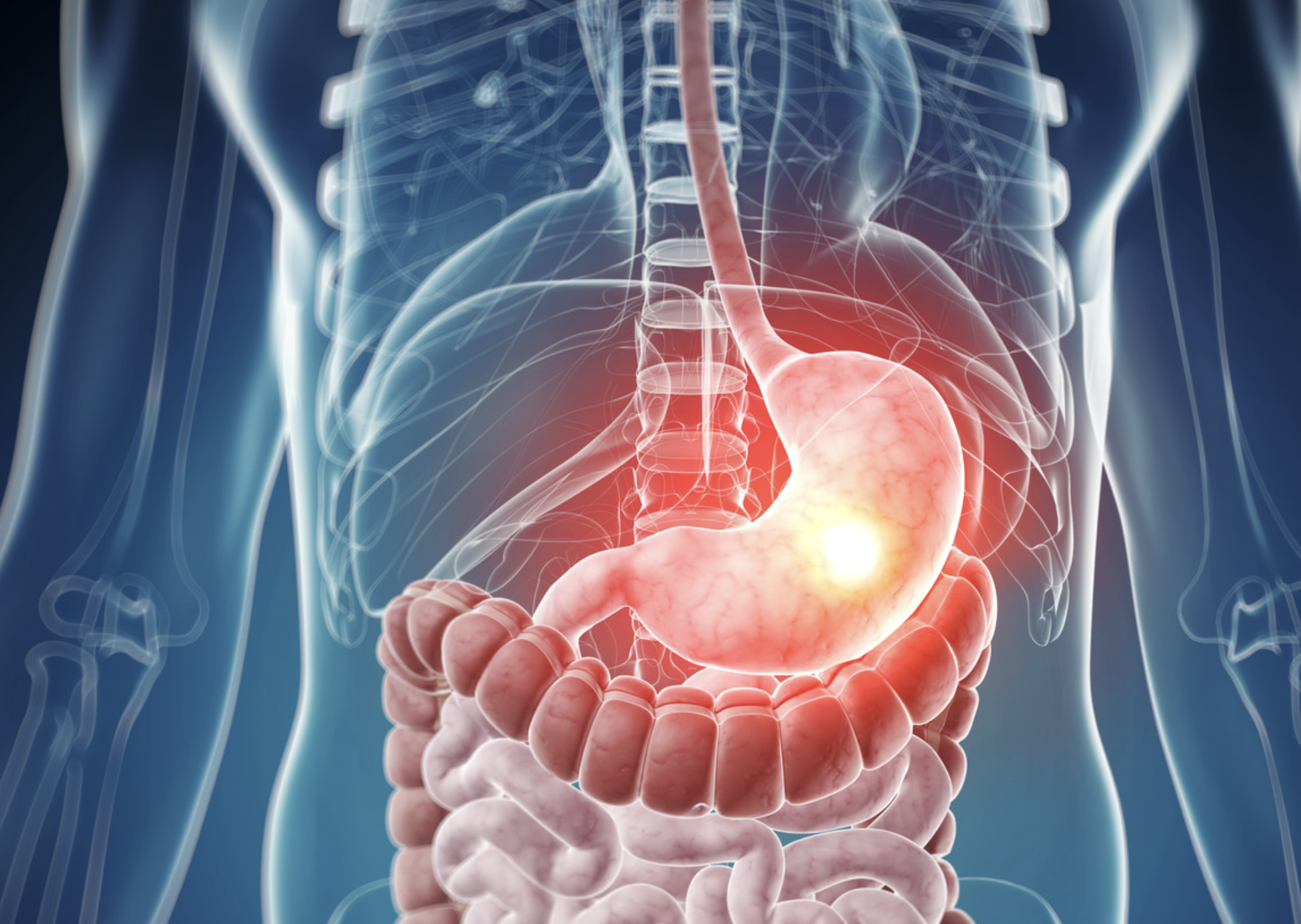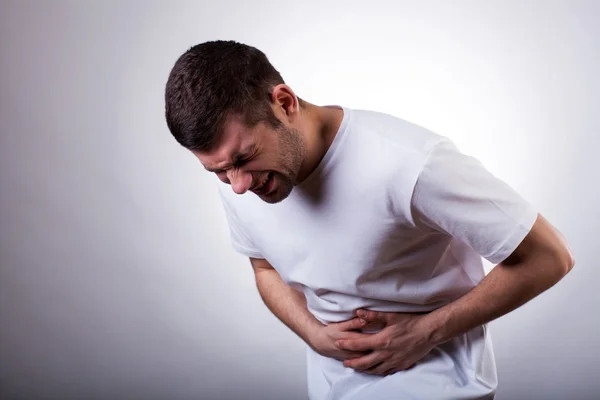Definisi
Gastritis adalah peradangan yang terjadi pada lapisan lambung, yang bisa terjadi akut atau tiba-tiba, atau muncul setelah bertahun-tahun (kronis). Gastritis erosif adalah kondisi medis yang serius dan memerlukan penanganan medis segera untuk mencegah kerusakan lebih lanjut pada lambung. Gastritis erosif adalah salah satu jenis lesi atau kerusakan di dalam lambung, terjadi kerusakan sel-sel epitel (sel yang berada di permukaan) yang berperan untuk membentuk sebuah pelindung pada permukaan bagian dalam lambung. Dapat timbul ulkus atau tukak pada lapisan lambung seiring erosi yang terjadi.
Selain mengenai sel epitel, selaput lendir di lambung juga mengalami kerusakan. Gastritis erosif adalah penyakit yang sangat umum terjadi pada lansia dan lebih sering menyerang pria ketimbang wanita. Orang-orang yang usianya lebih muda bisa juga terkena penyakit ini karena berbagai penyebab dan adanya faktor risiko. Adanya erosi pada lambung baru bisa diketahui melalui pemeriksaan penunjang.
Penyebab
Penyebab gastritis erosif tidak jauh berbeda dengan jenis gastritis lainnya. Namun, yang paling umum dapat menjadi penyebab gastritis erosif adalah penggunaan obat anti inflamasi non steroid (OAINS), sekelompok obat yang digunakan untuk meredakan peradangan, mengurangi nyeri dan menurunkan demam. Kelompok OAINS contohnya adalah ibuprofen, asam mefenamat dan diklofenak yang sering digunakan untuk meredakan nyeri dari berbagai kondisi. Konsumsi OAINS yang berkepanjangan bisa mengurangi kadar zat khusus yang melindungi lapisan perut. Semakin lama, lapisan pelindung lambung ini akan semakin menipis dan rusak, sehingga asam lambung bisa mengerosi lapisan lambung.
Konsumsi alkohol juga dapat menyebabkan gastritis karena zat yang terkandung pada alkohol bisa mengikis lapisan perut. Jika alkohol diminum secara berlebihan dan terus-menerus, perut akan rentan dengan berbagai masalah pencernaan, dan salah satunya adalah gastritis erosif. Stres sangat berpengaruh dengan kesehatan sistem pencernaan, terutama pada produksi asam lambung. Jika stress semakin parah, asam lambung akan diproduksi secara berlebihan. Kelebihan produksi asam lambung ini bisa mengiritasi lapisan lambung dan menyebabkan gastritis erosif.
Selain itu, beberapa penyebab lain yang lebih jarang namun dapat menyebabkan gastritis erosif adalah terapi radiasi yang dilakukan pada pasien kanker, bisa mengganggu sel-sel di lambung sehingga memungkinkan terjadinya kerusakan. Infeksi virus seperti cytomegalovirus dapat menyebabkan gangguan pencernaan, salah satunya gastritis erosif. Adanya cedera pada pembuluh darah juga bisa meningkatkan risikonya.
Faktor Risiko
Beberapa faktor yang dapat meningkatkan risiko terkena gastritis erosif yaitu usia dan stress. Usia menjadi salah satu faktor risiko karena peningkatan usia turut memengaruhi tingkat konsumsi obat-obatan pereda nyeri. Mereka juga memiliki organ pencernaan yang sudah mulai berkurang fungsi dan kondisinya. Selain itu stress berkepanjangan bisa memperburuk sistem pencernaan. Kebiasaan minum alkohol yang berlebihan dapat meningkatkan risiko erosi lapisan lambung. Faktor risiko lainnya adalah kebiasaan merokok, pola makan tinggi lemak atau garam, konsumsi obat pereda nyeri yang terlalu sering, penyakit autoimun seperti HIV/AIDS yang mengurangi kekebalan penderitanya sehingga mereka lebih mudah terserang penyakit, penyakit crohn (penyakit peradangan kronis pada saluran cerna), serta infeksi parasit.
Gejala
Beberapa pasien dengan gastritis erosif ringan sering kali tidak menunjukkan tanda. Namun pada beberapa kasus gastritis, gejala saluran cerna yang dapat timbul meliputi perut terasa mulas atau kembung, mual dan ingin muntah, nyeri ulu hati, sensasi panas di area dada hingga tenggorokan (heartburn), penurunan nafsu makan dan merasa kelelahan.
Sering kali, tanda pertama dari gastritis erosif adalah hematemesis atau muntah darah berwarna merah atau coklat seperti kopi. Selain itu, orang dengan kondisi ini juga mengalami gejala seperti melena yaitu kondisi perdarahan pada usus besar yang menyebabkan kotoran tinja berwarna hitam karena bercampur darah, dan keluarnya cairan bercampur darah akibat adanya perdarahan di saluran pernapasan dan lambung ketika tersedak karena kesulitan menelan. Gejala gastritis erosif ini biasanya terjadi dalam 2 sampai 5 hari. Pada kasus yang berat, perdarahan pada lambung ini bisa menyebabkan anemia (tubuh kekurangan sel darah merah).
Diagnosis
Untuk menegakkan diagnosis gastritis erosif dapat dilakukan wawancara yang mendalam (anamnesis) mengenai gejala yang dialami, riwayat kesehatan pasien, dan obat-obatan yang sedang dikonsumsi atau yang baru-baru ini tidak dikonsumsi lagi oleh pasien. Anamnesis biasanya diikuti dengan pemeriksaan fisik yang dilakukan oleh dokter.
Selanjutnya, untuk menunjang diagnosa, dokter bisa mengusulkan pemeriksaan penunjang seperti gastroskopi yang bertujuan untuk mendeteksi tanda-tanda peradangan di dalam lambung. Pemeriksaan dilakukan dengan menggunakan selang berkamera yang dimasukkan melalui mulut untuk melihat kondisi lambung. Gastroskopi dapat dikombinasi dengan pengambilan sampel jaringan di area lambung yang diduga mengalami erosi atau tukak, walaupun biasanya tidak selalu dilakukan pada setiap kasus gastritis.
Pemeriksaan pencitraan dengan menggunakan foto rontgen bertujuan untuk melihat kondisi saluran pencernaan bagian atas. Agar luka di saluran pencernaan, terutama lambung, dapat terlihat, dokter akan meminta pasien untuk menelan cairan barium sebelum foto rontgen dilakukan.
Tata Laksana
Gastritis erosif dapat diterapi dengan menggunakan obat penetral asam lambung seperti antasida dan obat penekan produksi asam lambung seperti ranitidine atau cimetidine. Bila gastritis disebabkan oleh penggunaan obat antiradang yang berlebihan, biasanya dokter akan menyarankan untuk menghentikan penggunaan obat tersebut. Obat penghambat produksi proton (PPI) seperti omeprazole atau lansoprazole juga dapat mengurangi produksi asam lambung. Obat PPI bisa meredakan kerusakan lapisan lambung dan dapat memajukan proses penyembuhan. Pada kondisi yang berat di mana terjadi perdarahan dan anemia, dokter akan memasang infus yang akan diberikan melalui pembuluh darah pasien, dan bila pasien mengalami anemia berat, bisa diberikan transfusi darah sesuai kebutuhan.
Selain mengonsumsi obat-obatan, perlu menerapkan perubahan gaya hidup agar gastritis erosif cepat membaik, seperti makan sedikit tapi sering, makan dalam porsi besar bisa merangsang produksi asam lambung berlebihan, sehingga akan memicu gejala. Akan lebih baik jika makan sedikit, tapi lebih sering. Menghindari makanan pemicu gejala, karena beberapa makanan dapat mengiritasi lambung terutama makanan pedas, asam dan berlemak. Berhenti minum alkohol karena alkohol dapat mengikis lapisan lambung sehingga memperparah gastritis erosif, berhenti minum obat anti radang berlebihan.
Komplikasi
Gastritis yang berlangsung lama dapat menyebabkan beberapa komplikasi seperti perdarahan kronis yang berujung pada anemia berat, ulkus peptikum di lambung dan usus dua belas jari, munculnya pertumbuhan tidak normal baik tumor jinak maupun ganas di dinding lambung.
Pencegahan
Beberapa langkah dapat dilakukan untuk mencegah timbulnya gastritis seperti minum OAINS sesuai anjuran dokter dan tidak berlebihan, karena obat ini diketahui dapat menyebabkan peradangan lapisan lambung yang bisa terjadi akut maupun kronis, hindari konsumsi makanan mentah atau makanan yang tidak bersih, konsumsi yogurt atau probiotik untuk meningkatkan jumlah bakteri baik di saluran pencernaan, mengurangi konsumsi alkohol karena bisa merangsang sel-sel lambung memproduksi asam lambung lebih banyak, berhenti merokok karena rokok mengandung bahan kimia yang bisa memperparah peradangan yang sudah ada sebelumnya. Selain itu penting untuk memperbaiki pola makan dan menghadapi stres.
Kapan Harus ke Dokter
Disarankan untuk segera memeriksakan diri ke dokter apabila muncul gejala seperti yang disebutkan diatas. Pada beberapa orang mungkin menunjukkan gejala yang berbeda-beda karena respons tubuh yang berbeda. Tingkat keparahan gejala juga bergantung seberapa banyaknya kerusakan yang terjadi pada lambung. Kadang kondisi ini tidak menimbulkan gejala, kecuali bila kerusakan sudah cukup berat. Jika gejala umum seperti mual atau nyeri ulu hati sudah membuat anda merasa tergangu, disarankan untuk segera pergi ke dokter.
Mau tahu informasi seputar penyakit lainnya? Cek di sini, ya!
- dr Hanifa Rahma
Vakil, N. (2021). Erosive Gastritis. Retrieved 12 Januari 2022, from https://www.msdmanuals.com/professional/gastrointestinal-disorders/gastritis-and-peptic-ulcer-disease/erosive-gastritis
Mayo Clinic Staff (2021). Gastritis. Retrieved 12 Januari 2022, from https://www.mayoclinic.org/diseases-conditions/gastritis/diagnosis-treatment/drc-20355813
Weisenberg, E. (2020). Erosive Gastritis. Retrieved 12 Januari 2022, from https://www.pathologyoutlines.com/topic/stomacherosive.html
Mfine. Erosive Gatritis. Retrieved 12 Januari 2022, from https://www.mfine.co/gastroenterologists/conditions/erosive-gastritis/












